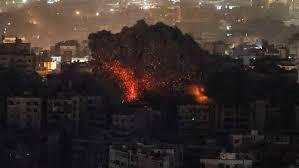Details of the Strikes:
Targets: The Israeli airstrikes focused on military sites in and around Tehran, including a weapons depot and military barracks. Explosions were reported near Tehran and Karaj
Objective: According to Israel Defense Forces (IDF) spokesperson Rear Admiral Daniel Hagari, the strikes aimed to eliminate threats to Israel, emphasizing the nation's right to self-defense against continuous Iranian aggression
Background:
Iran's Missile Attack: On October 1, Iran launched a barrage of over 180 ballistic missiles into Israel, resulting in casualties and escalating hostilities
Hezbollah Involvement: The escalation follows the reported assassination of Hezbollah leader Hassan Nasrallah, which Iran allegedly sought to avenge through its missile attacks
International Response:
United States: The U.S. was briefed on Israel's plans but did not participate in the strikes. It has expressed support for Israel's right to self-defense while urging caution to prevent further regional escalation
Iran: In response to the strikes, Iran closed its airspace and has yet to disclose the full extent of the damage. Iranian authorities have condemned the attacks and vowed retaliation
Regional Implications:
Potential for Escalation: The exchange of military actions raises concerns about a broader conflict involving other regional actors, including Hezbollah in Lebanon and various militant groups in Syria.
Humanitarian Concerns: The ongoing hostilities have led to significant civilian casualties and displacement, particularly in Gaza and southern Lebanon, exacerbating the humanitarian crisis in the region.




